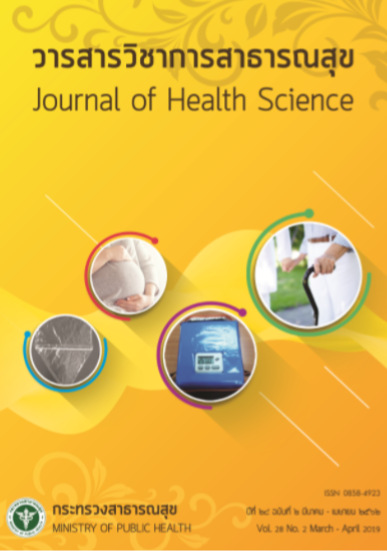Evaluation of Teenage Pregnancy Prevention and Solving Project in Nakhonsawan
Keywords:
teenage pregnancy, project evaluation, NakhonsawanAbstract
Teenage pregnancy is a problem affecting child health, family, community and the country as a whole. The objective of this study were to assess and analyze the situation of teenage pregnancy, and to develop policy recommendations to prevent and mitigate the problems in Nakhonsawan province. A mixed method was employed in the study, which included survey, documentation review and focus group discussion. Data were analyzed by using percentage and mean for quantitative data, and content analysis for qualitative data. It was found that average age of teenage pregnancy in Nakhonsawan was 17.6 years old and the minimum age was 12. They lived in poor family with young parents and had many family problems. They mostly intended to have sexual relationship with their couples. Once getting pregnant, they dropped-out of school and did not intend to work. Most of teenage girls lacked of knowledge on contraception use and sexual relationship skills which resulted in repeated pregnancies. Nakhonsawan Provicne had launched teenage pregnancy prevention and solving project based on 9 recommended tasks. The Project had resulted in a reduction of teenage pregnancy rate. However, the prevalence of repeated pregnancy had increased. Key success factors included the knowledge and understanding of implementers and parents as well as having skills to reach the adolescents. youth. The areas that needed improvement were the cooperation with local governments and the availability of database for decision making. In conclusion, effective teenage pregnancy prevention and solving project requires the proper knowledge and understanding of all key stakeholders; and the implementation measures should be based on the evidence and be consistent with the context, beliefs, values and culture of the teenagers and the communities. The main goals are to develop sexual relationship skills among young people. They should be familiar with contraceptive methods and have skills to use them. In addition, continueing monitoring, evaluation and quality improvement can be effective in reducing the rate on teenage pregnancy in the province.
Downloads
Downloads
Published
How to Cite
Issue
Section
License
Copyright (c) 2019 Journal of Health Science - วารสารวิชาการสาธารณสุข

This work is licensed under a Creative Commons Attribution-NonCommercial-NoDerivatives 4.0 International License.







